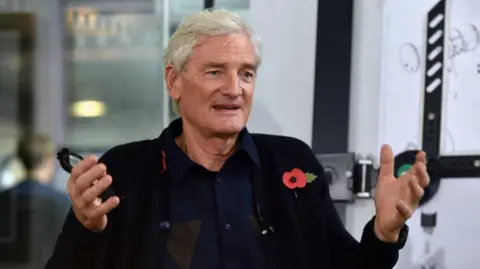15 minutes ago
By Emma Elgee & Michael Race, Reporter & business reporter, BBC News

 BBC
BBC
Sir James Dyson founded the firm in 1991
Consumer goods giant Dyson plans to cut up to a third of its UK workforce as part of a global shake-up.
The company, best known for the invention of the bag-less vacuum cleaner, said the proposals would ensure it was “prepared for the future” amid what it called “increasingly fierce and competitive global markets”.
But the move comes after staunch, long-running criticism from its founder Sir James Dyson of the UK economy policies, and the business moved its headquarters to Singapore in 2019.
Dyson currently has 3,500 UK employees, with offices in Wilshire, Bristol and London.
CEO Hanno Kirner said the company needed to be "entrepreneurial and agile".
“Decisions which impact close and talented colleagues are always incredibly painful," he said.
"Those whose roles are at risk of redundancy as a result of the proposals will be supported through the process."

 Dyson
Dyson
Sir James moved Dyson's global headquarters to Singapore in 2019
Dyson moved its head office to Singapore in 2019 to be closer to its manufacturing sites and supply chains. Asian markets account for more than half of its sales and Singapore also has a free trade agreement with the EU.
The company, which also makes air purifiers and hair dryers among other appliances, is still highly profitable. It increased its research and development spending by 40% last year.
Dyson has stated the announcement is a business decision, not a political one, and a result of its global review.
But Sir James has been highly critical of the UK’s economic policies.
Last year he said the UK had “woeful policies” such as high corporation tax, and said he would invest more in “modern, forward-looking economies elsewhere” that encourage growth and innovation.
Business of all sizes, much like households, have been hit by rising costs and bills in recent times. Corporation tax, which is paid on the profits of UK companies to the government, increased in April 2023 to 25% from 19%.
'A significant blow'
Danni Hewson, head of financial analysis at investment firm AJ Bell, said while the company had made it clear its plans were a long time in the making, there “have been questions about the future of the business in the UK since 2019”, when it moved its headquarters overseas.
“News that British appliance manufacturer Dyson is to pare back its UK workforce by a quarter is a significant blow not just to those losing their jobs but also Labour’s push to get the economy growing.
“The decision is an uncomfortable one and begs the question whether Sir James Dyson and his company believe the future must be found elsewhere.”
MP 'very concerned'
Roz Savage, the new Liberal Democrat MP for the South Cotswolds, said she was worried by the announcement.
She said: “It’s huge. Malmesbury is a close-knit community and I’m sure if people are in danger of losing their jobs then their pain is going to be felt by the whole community, by the local businesses and the local economy is going to be affected.
"This is potentially very big news and I’m very concerned.”
Wiltshire Council leader Richard Clewer said the council would do all it could to support those impacted during "an uncertain time".
Mr Clewer, who is also the councillor responsible for economic development, said he was "extremely sorry to hear" of the announcement, adding that many Dyson workers were based in Wiltshire.
'Huge amount of cost-cutting'
Prof Andrew Graves, a mechanical engineer and political scientist from the University of Bath, said those inside the industry were not surprised by the announcement and "had been warning about this for a long time".
"Right across the world there is huge competition with the Dyson products and a lot of Dyson products really haven’t been successful of late," he said.
"They put aside two billion to build an electric car in Hullavington and that was withdrawn fairly quickly when they realised it was too difficult.
“And also some of their latest products haven’t been too great in the market place, they are really fighting on all fronts at the moment.
"This is a huge amount of cost-cutting," he added.
Prof Graves added if there were large scale redundancies it would be "devastating" for the town of Malmesbury.
 (1).png)
 7 months ago
16
7 months ago
16


















